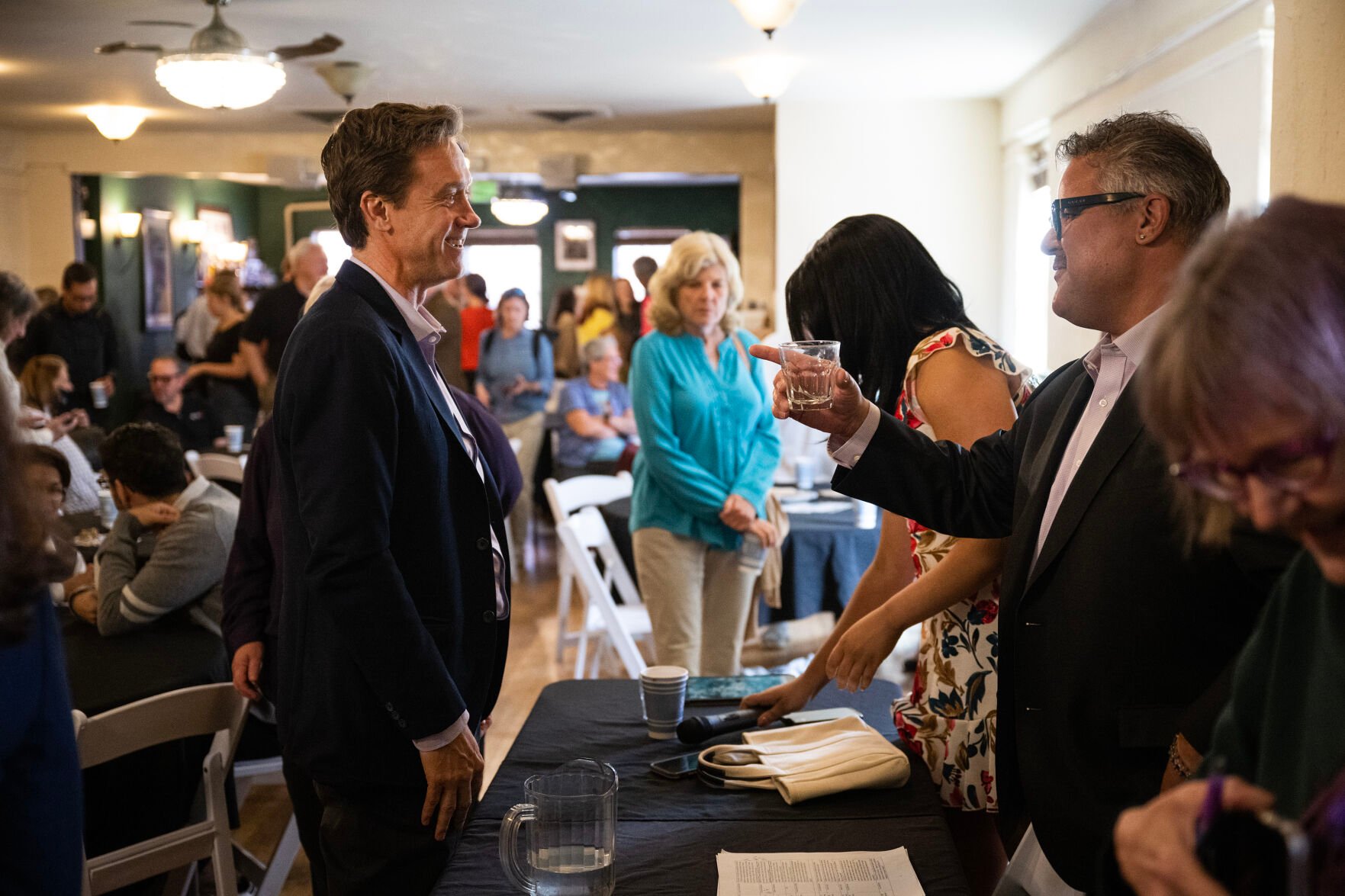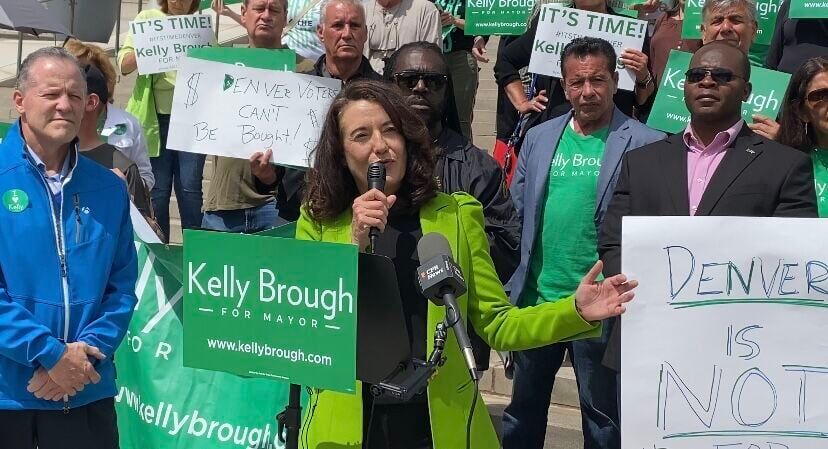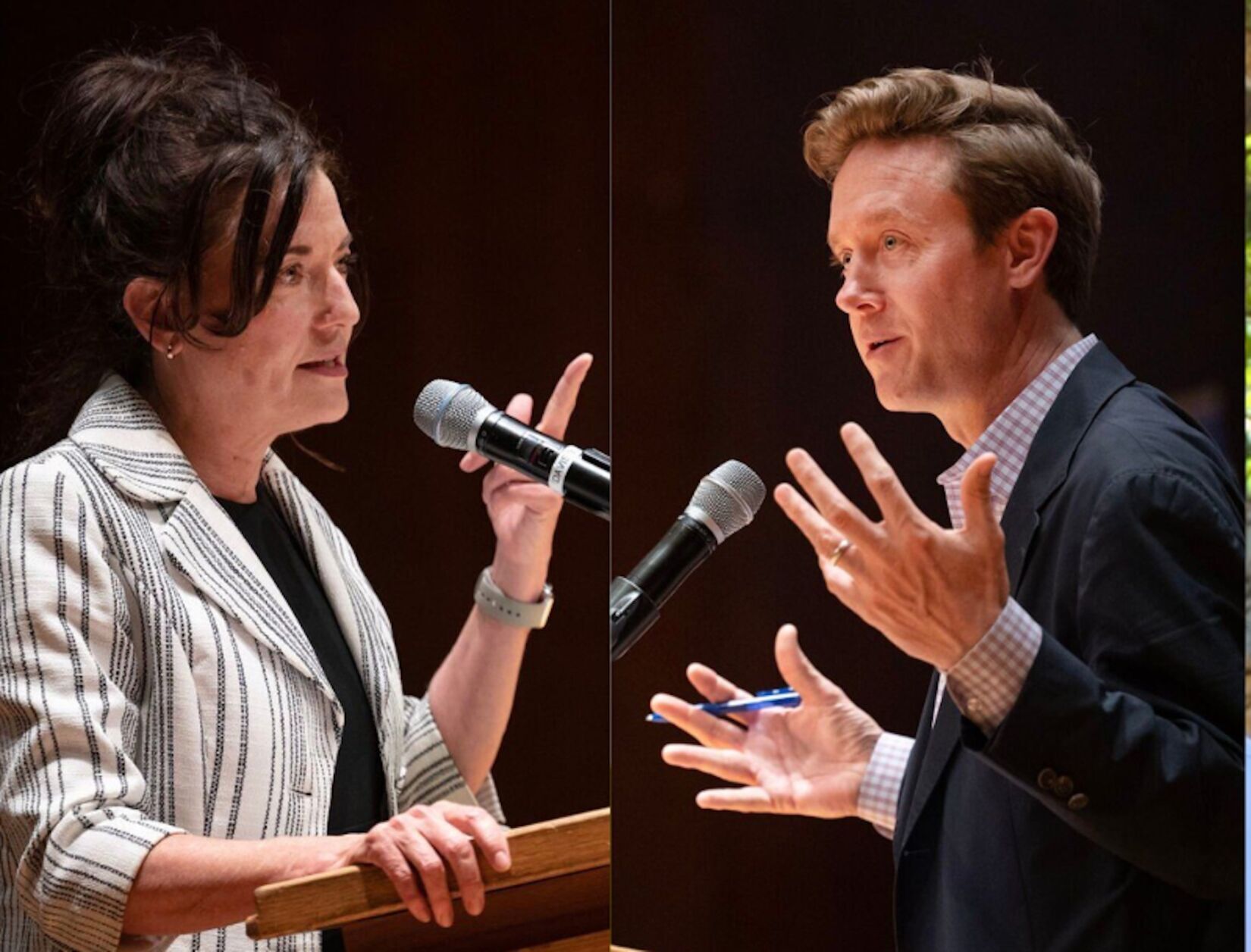Experts offer mixed assessments on endorsements’ sway in Denver’s race for mayor

The string of endorsements that Kelly Brough and Mike Johnston received – and touted – hints of a philosophical bifurcation among their supporters, with progressive politicians lining up behind Johnston and more centrist personalities supporting Brough.
Or at least that’s the prevailing narrative, as both campaigns prepare for a last-minute push for votes before the June 6 runoff election.
But the extent of that bifurcation remains complicated to ascertain, as both candidates, who seek to replace outgoing Mayor Michael Hancock, also enjoy the support of leaders considered to be a part of the “establishment.” In addition, many view Brough and Johnston as hewing closer to the center than their rivals in the April 4 elections.
The bigger question, however, is to what extent the endorsements help the candidates.
Michael Dino, a political expert who served as campaign manager for former Mayor Wellington Webb, said amplifying the endorsements is key, particularly at a time when the influence of newspapers’ endorsements is much more dispersed, and some politically active groups also no longer hold as much sway.
“Mayor Webb benefited from the Rocky Mountain News endorsement as a candidate, who, you know, didn’t have a lot of presence in the polls,” Dino said, noting that U.S. Sen. John Hickenlooper, when he ran for mayor, also benefited from newspaper endorsements, which gave him “validity.”
“Nowadays, the media, both print and online media, is so dispersed it’s hard to gain any traction from those endorsements. So, you have to promote them in your own way.”
The same principle applies to labor unions’ endorsements – they must be aggressively promoted, Dino said.
“Labor-related unions probably had a little more meaning in the past because, well, more people who were in unions lived in Denver because of affordability,” Dino said.
Today, blue collar workers unable to get housing within city limits have to live in Denver’s suburbs, so their unions’ endorsement, while it helps, must also be amplified.
Some strategists said the progressive and centrist labels ultimately matter less in Denver’s race for mayor.
“I actually think the Denver voters are more pragmatic than looking at endorsements, and I also think that they will look past the kind of progressive lens,” Alan Salazar, the chief of staff to Hancock, said at a forum hosted by The Denver Gazette and Colorado Politics on Wednesday.
“It would be fairer to both candidates if they did so, because if you know, Mike Johnson, he worked with Republicans and he was known as a pretty centrist legislator in the Senate, and, if you know, Kelly Brough, she was a progressive leader of the chamber, probably the most progressive, liberal-leaning leader of the chamber in modern memory,” Salazar added.
Salazar and other panelists – Steve Welchert, president and director of the Welchert Company; Ian Silverii, founder of The Bighorn Company; Mike Kopp, president and CEO of Colorado Concern; and, Ernest Luning, senior reporter of Colorado Politics – noted that Johnston received support from progressive stalwarts, notably state Rep. Leslie Herod, D-Denver, and Lisa Calderon, while Brough drew the backing of police and firefighters’ unions, as well as the Denver Republican Party.
But it remains to be seen whether the endorsements translate to either candidate solidifying support among the ideological segments of Denver voters.
“Mike (Kopp) had it right,” Welchert said. “It’s a pragmatic race – who can get stuff done.”
Silverii, on the other hand, maintained it’s “pretty telling” that Johnston is getting the endorsements of progressives, while Brough has secured the support of conservatives and Republicans and that it “matters if voters know that or not.”
“But the question is – has that been communicated broadly? I haven’t seen any ads saying, ‘You know, Kelly’s endorsed by Republicans,’ or ‘Johnston’s endorsed by ‘ultra-left liberals’ or anything like that,” he said.
The two campaigns and the independent expenditure groups supporting each have played up the endorsements, a clear effort to tell voters the candidates’ have broad support.
One of the pro-Johnston IE’s ads, for example, prominently noted the endorsements he received, including from Calderón, Herod and state Sen. Julie Gonzales, who is also a progressive stalwart. The pro-Brough IE, on the other hand, also featured appearances by former Gov. Bill Ritter, former Denver Mayor Wellington Webb and his wife, former state Rep. Wilma Webb, and the city’s police union.
Brough also secured the endorsement of state Sen. Chris Hansen, former Gov. Bill Ritter, and the Denver Metro Association of Realtors. Johnston received the backing of former Mayor Federico Peña, Dottie Lamm, and former mayoral candidates Terrance Roberts and Ean Tafoya.
Kopp, a former Senate minority leader, said while he, too, senses that Johnston is doing better among progressive voters, that might have less of a sway if more older voters turned out to vote than younger ones.
“First of all, most of the voters in the general election were older, not younger. I would think that that would incline more toward Kelly’s benefit, if the view is that Mike is doing better with progressives,” Kopp said.
Kopp also noted that the Democratic Socialists of America slate of council candidates “really got brushed back.”
“You had a couple that worked through on the at-large races. But (Candi) CdeBaca didn’t win outright and some of the other DSA candidates that were were strong, effective candidates – well-funded, certainly – didn’t make it,” Kopp said.
“That’s why I do think it’s going to wind up being sort of a horse race all the way to the end,” he added.
Agreeing with Salazar, Welchert said whoever sits as the next mayor won’t have much of a honeymoon period.
“If they’re not moving the meter much faster, in a year, there’ll be pitchforks out,” Welchert said. “People will be coming after them, they will not last long. And that’s the brutal reality of it. You know, you campaign in poetry, govern in prose, right? They’re going to have to govern with their sleeves up and get after it really fast.”
In this Colorado Conversations episode, the state’s top political consultants and strategists weigh in on the June 6 runoff election for Denver mayor between Kelly Brough and Mike Johnston. The panelists include Alan Salazar, chief of staff of Mayor Michael Hancock; Steve Welchert, president and director of the Welchert Company; Ian Silverii, founder of The Bighorn Company; Mike Kopp, president and CEO of Colorado Concern; Ernest Luning, senior reporter of Colorado Politics.





